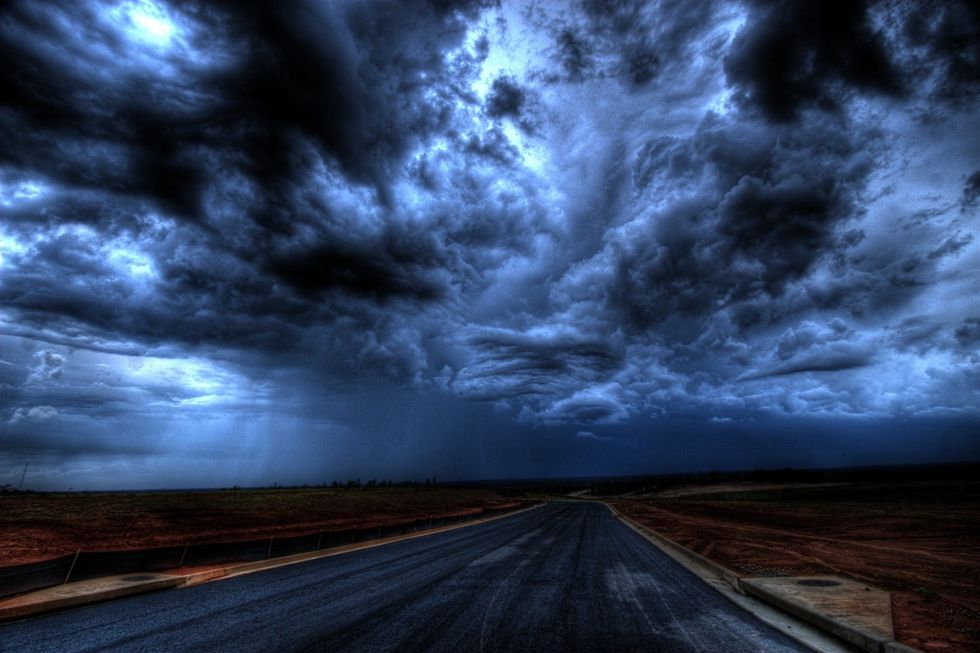Darkness Is My Closest Friend: Becoming A Creature Of Stone And Steel
Doesn't Sam, in this passage sound invincible? Maybe he couldn't do everything, but he can weather anything.
"You have taken from my friend and neighbor --
darkness is my closest friend." (Psalm 88:18)
As an aside, I have recently been studying the link between neuroscience of religion, or neurotheology, much of late. What does it mean for your brain when you are religious? Well, neuroscientist, Dr. Andrew Newberg, answered some of these questions in 2010, and Dr. Jeff Anderson studied the link between spiritual experiences and brain activation. Interestingly, Anderson found, through fMRI brain imaging studies of devout Mormons, that profound religious experiences activate the nucleus accumbens, the region in the brain associated with processing reward, so love, sex, gambling, and drugs activate the same feelings as religion.
More to the topic, however, what does it mean to have darkness as your closest friend? These words could have been uttered by Job amidst his suffering. Renowned Presbyterian Minister, Tim Keller, recalls an Old Testament professor who told him that Job honored God, even when he said terrible things about God as he suffered. Why, in Job 42, does God rebuke Job's friends and glorify Job, when he prayed in anger and in rage?
The answer is that Job never walked away from God. He didn't understand God, and he sure gets angry with God. But he never walks away from God. He stayed with God when his entire family died. He stayed with God when his friends abandoned him. He stayed with God when he was angry. At the end of Job, Satan is defeated.
I want to live like Job, who prays something like "darkness is my closest friend" when every circumstance in his life would suggest that there is no God or that God is evil. True faith, according to Keller, is when you say "I'm not getting anything out of this, but I'm still going to pray and I'm still going to go to church and worship. I'm still going to love my neighbor and I'm still going to do the things I ought to do." That means worshipping a God in a manner that isn't transactional, that doesn't expect anything in return, that doesn't feel the need to earn God's love.
A true faith is one that is tested, that doesn't only rely on God when things are going right, but that turns to God when seemingly everything is going wrong. A true, Protestant relationship with God is not transactional. We are not meant to pray so something can go right. God was not meant to serve us. We were not to serve ourselves. A true Christian aims to serve God, and that's something I fail to realize all too often.
Keller next makes an analogy to the end of the Lord of the Rings books, in "The Return of the King," when Sam Gamgee looks up to the mountain of Mordor and frets, realizing that their party was going to die. But at this moment came a glimmer of hope and realization:
"But even as hope died in Sam, or seemed to die, it was turned to a new strength. Sam's plain hobbit-face grew stern, almost grim, as the will hardened in him, and he felt through all his limbs a thrill, as if he was turning into some creature of stone and steel that neither despair nor weariness nor endless barren miles could subdue."
Doesn't Sam, in this passage sound invincible? Maybe he couldn't do everything, but he can weather anything.
And so we go back to Psalm 88, one of the most despair-ridden and depressing verses of the Bible. In Psalm 88:8, the Psalmist prays that "You have caused my companions to shun me;/ you have made me a horror to them./ I am shut in so that I cannot escape;" So not only was this Psalmist depressed, but he sure was lonely, too. Perhaps he suffered from leprosy or some disease that led his former friends not to want to see him, or perhaps he was simply a pariah. Often, betrayal by friends is much harder to deal with than scorn from enemies.
The author of Psalm 88 was Heman, a musician that served under David. An author of many of the Psalms, Heman wrote many of the greatest literary songs of his generation, and even today in the world. Keller stretches this analogy and says that millions have been helped by Heman. It was through his suffering that he became an artist, much like pressure from volcanic eruptions forms diamonds.
But did Heman know that millions would be helped by his Psalms? Absolutely not! But that's the point: in the moment, when we are suffering, when our lives are awful, we might not see how we're becoming something greater through God until much later. We might not even see it in our lifetimes, but that doesn't mean it's not happening.
And it's important to think about how God is represented at the end of Psalm 88, as well. Darkness is our closest friend. In darkness we cannot see God, and it is in this moment, in Matthew 27:45 and Matthew 27:52, of Jesus on the cross: "Now from the sixth hour there was darkness over the land until the ninth hour...The tombs were also opened. And many bodies of the saints who had fallen asleep were raised." Jesus received total darkness for three hours in the Gospel of Matthew.
He received the wrath of God at that moment. For all those hours, with his disciples gone, denied him or betrayed him, his father abandoned him, darkness was his only friend.
In taking on the darkness he took on the sins of all of his humanity. And Keller argues that when we feel darkness, we still know that Jesus is still there, because he took on all the darkness. And no matter what we've done, he will be there for us, because he's taken all the darkness for us. Christianity is unique from other religions in that there is a God that suffers with and for humanity.
So God is good, even when life isn't. We won't know it now, and we might not even know it soon. But eventually, we will see the purpose, and through that belief and knowledge we become, like Gamgee, a creature of stone and steel that neither despair nor weariness nor endless barren miles could subdue.































































































